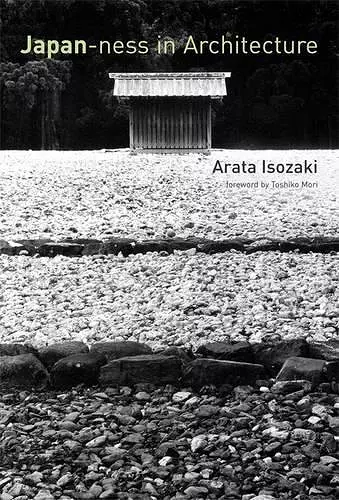Japan-ness in Architecture
Arata Isozaki author David B Stewart author Sabu Kohso translator
Format:Paperback
Publisher:MIT Press Ltd
Published:25th Feb '11
Should be back in stock very soon

This work explores the concept of Japan-ness through key architectural events from the seventh to the twentieth century, blending historical analysis, personal reflection, and critical insights into Japanese cultural identity.
In Japan-ness in Architecture, renowned Japanese architect Arata Isozaki explores the concept of Japanese identity as reflected through significant events in the nation’s architectural history, spanning from the seventh to the twentieth century. Isozaki argues that buildings should not be viewed merely as static objects; instead, they embody the social and historical narratives of their time. Through a series of essays, he delves into key structures, revealing how they illustrate the essence of what it means to be Japanese.
The book opens with Isozaki's reflections on the challenges faced by modern Japanese architects, including his own endeavors to forge a distinctly Japanese architectural identity amidst the influences of modernity. He revisits historical landmarks such as the Ise Shrine, the Todai-ji Temple, and the Katsura Imperial Villa, each representing unique facets of Japan-ness. He contrasts the ritualistic nature of Ise's precincts with Western notions of permanence, emphasizing the dynamic relationship between architecture and cultural evolution.
Isozaki also critiques the tendency to romanticize Japanese aesthetics, which he terms Japanesquization. He argues that this approach often overlooks the vibrant, transformative energy that characterizes Japan's architectural heritage. By combining historical analysis, theoretical insights, and personal narrative, Isozaki’s essays not only affirm his status as a leading architectural thinker but also provoke a deeper understanding of Japan's cultural identity in a global context.
"Drawing on both his own extensive experience as a practicing architect and a broad grasp of world history, Arata Isozaki takes on the century-old debate over what is (or should be) 'Japanese' about Japanese architecture. This self-reflective critique is fresh and timely, and in the process provides provocative arguments about the shape of all Japanese history."--Henry D. Smith, II, Professor of Japanese History, Columbia University "Iconoclastic and erudite, opinionated and insightful, wily and contrarian this exciting book should be widely read not only by architects, but by anyone interested in Japan. Isozaki's essays are at once autobiographical and oracular; the collection, written over decades and discussing buildings spanning centuries, establishes his personal struggle with being Japanese in a global era as one that offers provocative insight into the culture of Japan yesterday, today, and tomorrow." Dana Buntrock , Department of Architecture, University of California, Berkeley "Iconoclastic and erudite, opinionated and insightful, wily and contrarian -- this exciting book should be widely read not only by architects, but by anyone interested in Japan. Isozaki's essays are at once autobiographical and oracular; the collection, written over decades and discussing buildings spanning centuries, establishes his personal struggle with being Japanese in a global era as one that offers provocative insight into the culture of Japan yesterday, today, and tomorrow."--Dana Buntrock, Department of Architecture, University of California, Berkeley
ISBN: 9780262516051
Dimensions: 229mm x 152mm x 17mm
Weight: 635g
376 pages